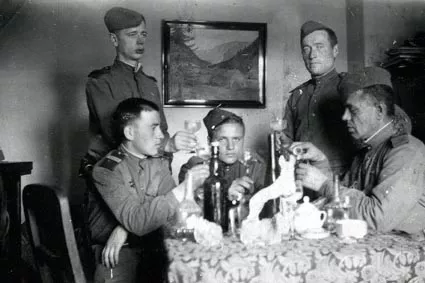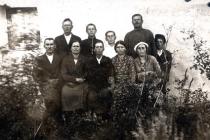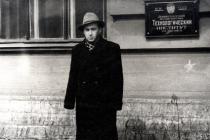Igor Lerner and his brother-officers
This photograph was taken in Vienna in 1945 (on the 10th of May). Here you see me celebrating the Victory Day together with my brother-officers. Now I’ll tell you about the first days of the war.
War burst out when I finished the 9th grade.
My elder brother was a professional soldier and served in the Far East. Jacob was drafted in 1942. I joined a volunteers battalion. Those battalions were created for struggle against saboteurs, spies, and gunlayers which launched signal rockets near the military objects, etc. They gave each of us a rifle, 120 live cartridges, a gas-mask. We kept it at home. We lived at home and studied at school, but at any time on a signal we had to run fast to the alarm post. Officers from NKVD waited for us there. Usually we searched the district. 2 or 3 times paratroopers touched down nearby and we managed to neutralize them. Sometimes we were on duty near important objects (it was called to stay in secret). After a while we were lodged in barracks in Pargolovo, near Olgino. There we stayed till January of 1942. We were very hungry. I realized that it became useless to study at school and handed in an application of an army volunteer. They sent me to a military camp. So I became a real soldier.
But they had no right to send me to the front line: I was under 17. Therefore I served in the horsed antitank regiment. I took care of the mare. By the way they gave me a sabre, I teetered after belting it on: I was very thin. The mare needed care like a child. Each morning before washing myself, I started cleaning my mare. In the afternoon they usually carried out mock battle: 4 mares did their best to pull an antitank gun. One day we came back a mock battle, but were not allowed to get into barracks: they read out surnames of soldiers with secondary education. My name was in that list, too. The commander told us that Germans racked Leningrad with fire using long-range artillery. At that time we had no opportunities to stop it, but it was necessary to do something. Reconnaissance units went searching those guns, but did not come back. Therefore they created a special unit (top secret) for detection of those guns. Members of that unit had not to search those guns in the woods and ravines, but to find its location by means of certain calculations (basing upon sound-waves of the guns). They moved us to a separate barrack with real beds: it was good to stop sleeping on plank beds. [Plank bed is a primitive construction for sleeping: some sort of duck-boards fixed perpendicular to the wall.] They fed us well, but we had to study 8 hours a day.
Leningrad was already in blockade. My ration saved both my and my Mom's life. Every third day she came to me and I gave her my bread and that of my 3 comrades. The next 3 days I had to give my bread to my friends. Soon I managed to persuade Mom to evacuate, and she left for Altai region. 2 years later my brother Jacob was wounded, and after hospital treatment he went to Mom's place.
We studied rather difficult subjects: besides knowledge it required intuition. Three months later our skill was checked up near Kolpino. I managed to find two big guns and was awarded a medal For Military Merits. I understood that I had the only chance to survive in this war: to continue my service in that unit. We studied three months more and were sent to the Finnish front. Soon we were taken back to the Leningrad front. At the end of December 1943 they alarmed us and sent to the Oranienbaum Pyatachok (across the Gulf of Finland). [Oranienbaum Pyatachok was a small sector of the front near the Gulf of Finland. It became an impassable obstacle to fascists and did not permit them capture Leningrad.]
One day in the morning we were told that a great offensive would happen soon. We had to find location of all guns around us. It was not so easily because (for example) tanks changed their place after a shot, so it made it impossible for us to define their location. Fascists hunted for us, therefore we were specially guarded and always took up position in the most safe dugouts. But on the other hand we were rather defenseless, because it was impossible to place any guns near our dugouts: fascists could try to destroy them by bombing and the bomb could accidentally find us. One day connection with one of our receivers was broken and I (together with 2 submachine gunners) went to search for the break. We found it: the wire got fouled up in the big bush. We came closer to unhook the wire and suddenly saw Germans sitting under the bush. They saw us and rushed away, but we managed to seize one of them. Those Germans attached explosive to the wire, hoping to blow up us in case we pulled the wire.














